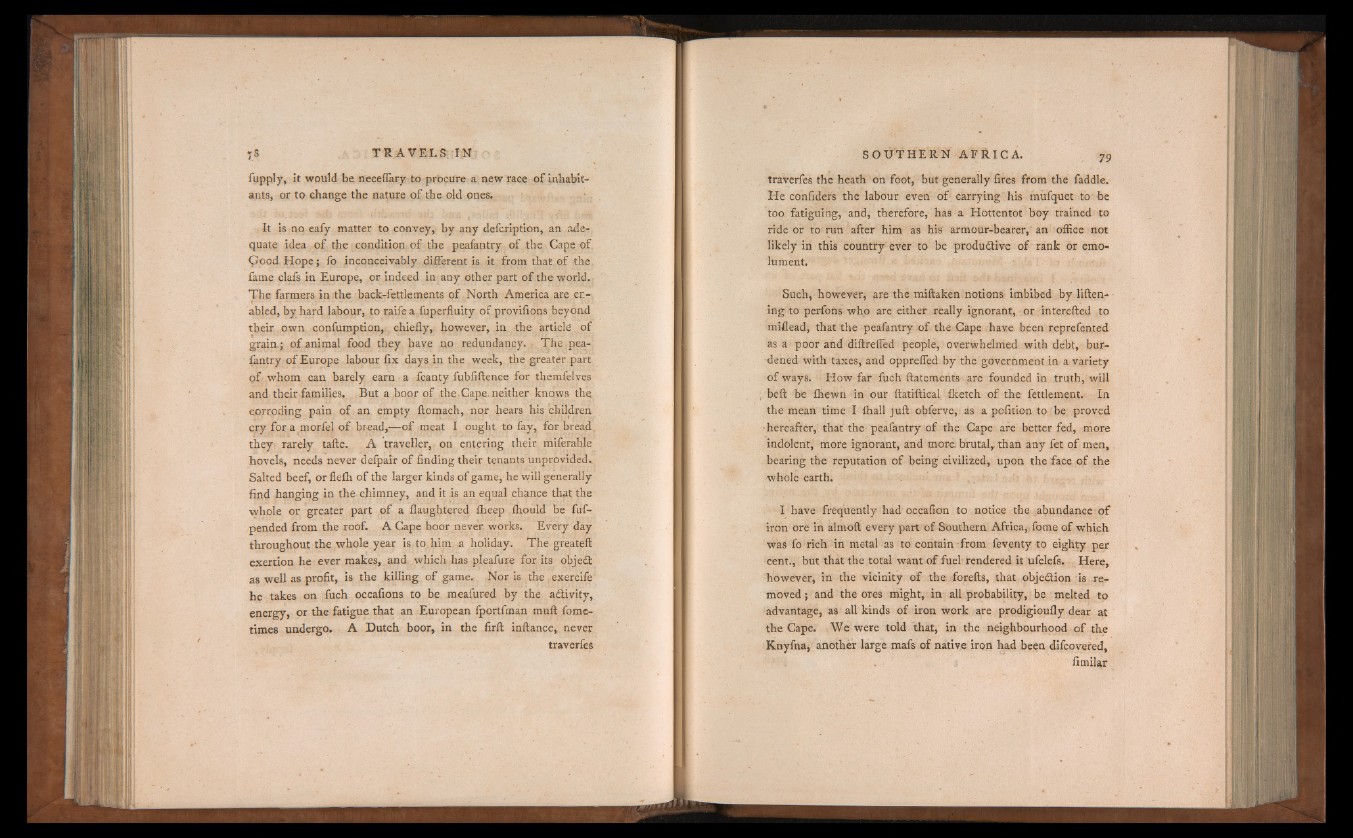
fupply, it would be neceffary to procure a new race of inhabitants,
or to change the nature of the old ones.
It is no eafy matter to convey, by any defcription, an adequate
idea of the condition of the peafantry of the Cape of
Good Hope; fo inconceivably different is it from that of the
fame clafs in Europe, or indeed in any other part of the world.
The farmers in the back-fettlements of North America are enabled,
by hard labour, to raife a fuperfluity of provifions beyond
their own confumption, chiefly, however, in the article of
grain; of animal food they have no redundancy. . The pea-
lantry of Europe labour fix days in the week, the greater part
of whom can barely earn a fcanty fubfiftence for themfelves
and their families. But a boor of the Cape, neither knows the
corroding pain of an empty ftomach, nor hears his children
cry fora morfel of bread,— of meat I ought to fay, for bread,
they rarely tafte. A traveller, on entering their miferable
hovels, needs never defpair of finding their tenants unprovided.
Salted beef, or fleih of the larger kinds of game, he will generally
find hanging in the chimney, and it is an equal chance that the
whole or greater part of a flaughtered iheep ihould be fuf-
pended from the roof. A Cape boor never works. Every day
throughout the whole year is to him a holiday. The greateft
exertion he ever makes, and which has pleafure for its objeCt
as well as profit, is the killing of game. Nor is the exercife
he takes on fuch occafions to be meafured by the activity,
energy, or the fatigue that an European fportfman muft fomc-
times undergo. A Dutch boor, in the firft inftance, never
traverfeS
traverfes the heath on foot, but generally fires from the faddle.
He confiders the labour even of carrying , his mufquet to be
too fatiguing, and, therefore, has a Hottentot boy trained to
ride or to run after him as his armour-bearer, an office not
likely in this country ever to be productive of rank or emolument.
Such, however, are the miftaken notions imbibed by liften-
ing to perfons who are either really ignorant, or interefted to
miflead, that the peafantry of the Cape have been reprefented
as a poor and diftrefled people, overwhelmed with debt, burdened
with taxes, and oppreffed by the government in a variety
of ways. How far fuch ftatements are founded in truth, will
. beft be ihewn in our ftatiftical fketch of the fettlement. In
the mean time I ihall juft obferve, as a pofition to be proved
•hereafter, that the peafantry of the Cape are better fed, more
indolent, more ignorant, and more, brutal, than any fet of men,
bearing the reputation of being civilized, upon the face of the
whole earth.
I have frequently had occafion to notice the abundance of
iron ore in almoft every part of Southern Africa,, fome of which
was fo rich in metal as to contain from feventy to eighty per
cent., but that the total want of fuel rendered it ufelefs. Here,
however, in the vicinity of the forefts, that objection is removed
; and the ores might, in all probability, be melted to
advantage, as all kinds of iron work are prodigioufly dear at
the Cape. We were told that, in the neighbourhood of the
Knyfna, another large mafs of native iron had been difcovered,
fimilar